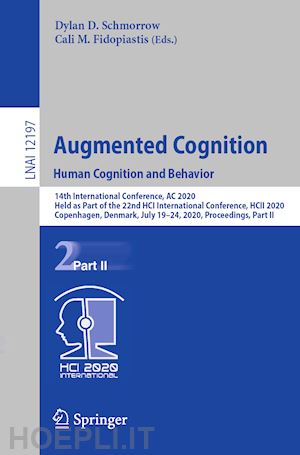
Questo prodotto usufruisce delle SPEDIZIONI GRATIS
selezionando l'opzione Corriere Veloce in fase di ordine.
Pagabile anche con Carta della cultura giovani e del merito, 18App Bonus Cultura e Carta del Docente
From a total of 6326 submissions, a total of 1439 papers and 238 posters has been accepted for publication in the HCII 2020 proceedings.
The 21 papers presented in this volume were organized in topical sections as follows: cognitive modeling, perception, emotion and interaction; electroencephalography and BCI; and AI and augmented cognition.
Augmented Cognition in Learning.- Assessing Intravenous Catheterization Simulation Training of Nursing Students Using Functional Near-Infrared Spectroscopy (fNIRs).- Using fMRI to Predict Training Effectiveness in Visual Scene Analysis.- Synthetic Expertise.- The Expertise Level.- The Dark Sides of Technology - Barriers to Work-Integrated Learning.- Exploring the Effects of Immersive Virtual Reality on Learning Outcomes: A Two-Path Model.- Flip-Flop Quizzes: A Case Study Analysis to Inform the Design of Augmented Cognition Applications.- Metastimuli: an Introduction to PIMS Filtering.- How Gamification Increases Learning Performance? Investigating the Role of Task Modularity.- Increasing Engagement in a Cyber-Awareness Training Game.- Augmented Cognition for Well-being, Health and Rehabilitation.- Acceptability and Normative Considerations in Research on Autism Spectrum Disorders and Virtual Reality.- Feedback Control for Optimizing Human Wellness.- The Case for Cognitive-Affective Architectures as Affective User Models in Behavioral Health Technologies.- Gathering People’s Happy Moments from Collective Human Eyes and Ears for a Wellbeing and Mindful Society.- Examination of Stammering Symptomatic Improvement Training using Heartbeat-linked Vibration Stimulation.- Guided Mindfulness: Using Expert Schemas to Evaluate Complex Skill Acquisition.- An Overview of Virtual Reality Interventions for two Neurodevelopmental Disorders: Intellectual Disabilities and Autism.- Human Cognition and Behavior in Complex Tasks and Environments.- Effect of Robotic Surgery Simulators in Training Assessed by Functional Near-Infrared Spectroscopy (fNIRs).- Preparing for Cyber Crisis Management Exercises.- Tracking Technostress: A Task-Interruption of Data Entry Study.- Enhancing Reality: Adaptation Strategies for AR in the Field.- Confronting Information Security's Elephant, the Unintentional Insider Threat.- Adapting Interaction to Address Critical User States ofHigh Workload and Incorrect Attentional Focus – an Evaluation of Five Adaptation Strategies.- Information-Theoretic Methods Applied to Dispatch of Emergency Services Data.- Experimental Evaluation of an Adaptive Planning Assistance System in Manned Unmanned Teaming Missions.- Cognitive Variability Factors and Passphrase Selection".- Variable Self-efficacy as a Measurement for Behaviours in Cyber Security Operations.- Probing for Psycho-Physiological Correlates of Cognitive Interaction with Cybersecurity Events.- Tracking and Improving Strategy Adaptivity in a Complex Task.- Computing with Words in Maritime Piracy and Attack Detection Systems.- Modeling User Information Needs to Enable Successful Human-Machine Teams: Designing Transparency for Autonomous Systems.- The Role of Gaze as a Deictic Cue in Human Robot Interaction.











Il sito utilizza cookie ed altri strumenti di tracciamento che raccolgono informazioni dal dispositivo dell’utente. Oltre ai cookie tecnici ed analitici aggregati, strettamente necessari per il funzionamento di questo sito web, previo consenso dell’utente possono essere installati cookie di profilazione e marketing e cookie dei social media. Cliccando su “Accetto tutti i cookie” saranno attivate tutte le categorie di cookie. Per accettare solo deterninate categorie di cookie, cliccare invece su “Impostazioni cookie”. Chiudendo il banner o continuando a navigare saranno installati solo cookie tecnici. Per maggiori dettagli, consultare la Cookie Policy.